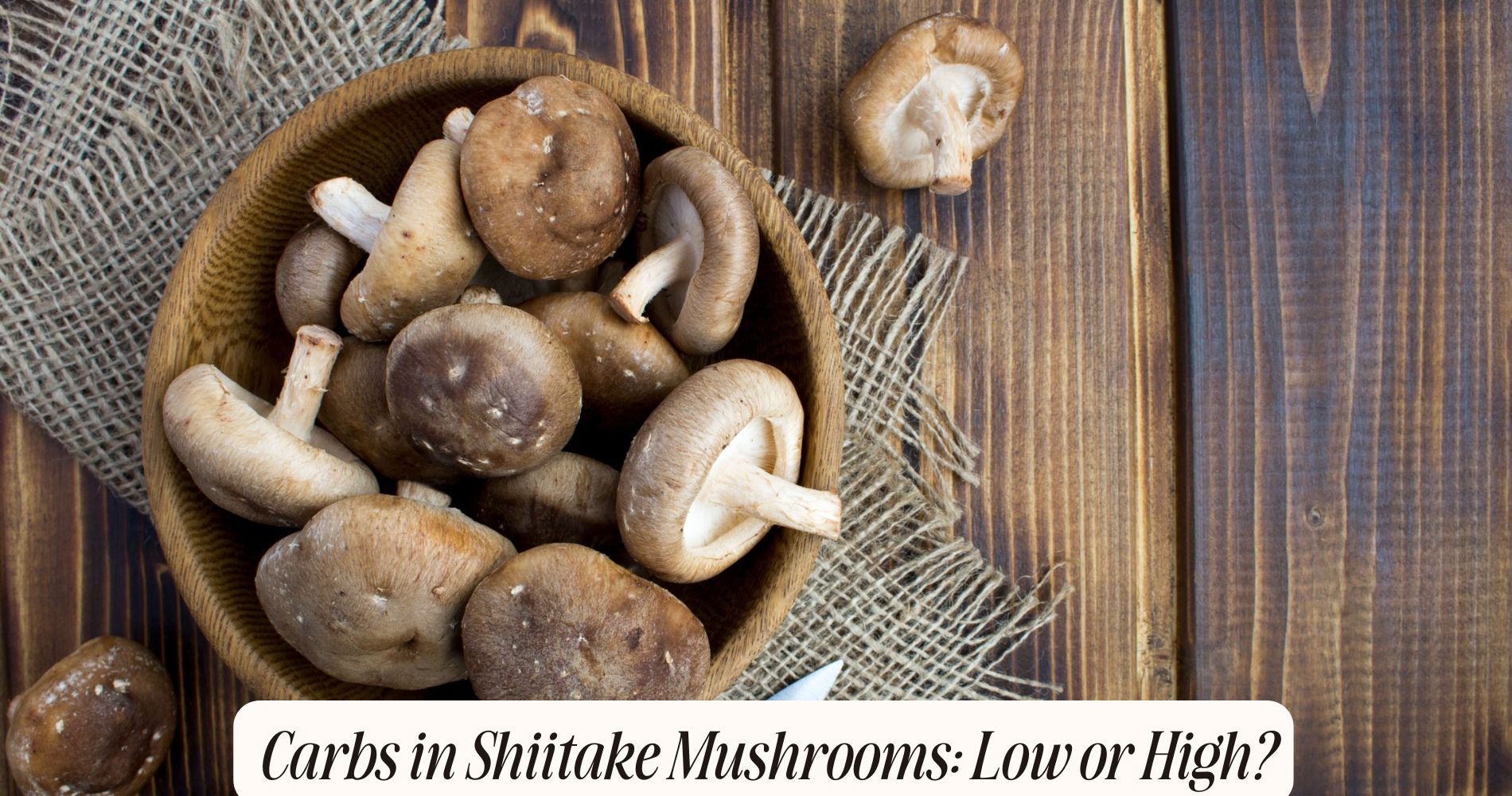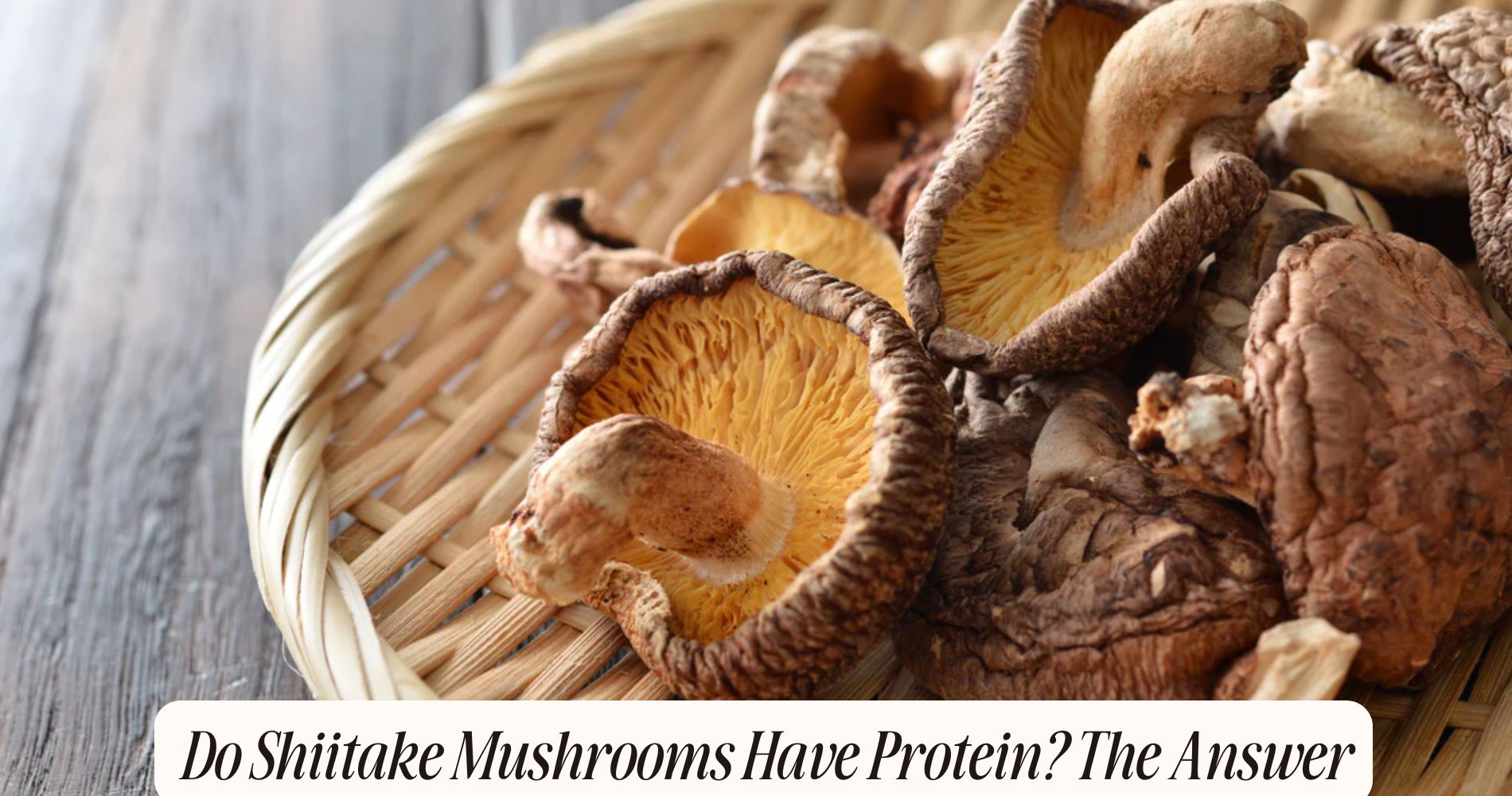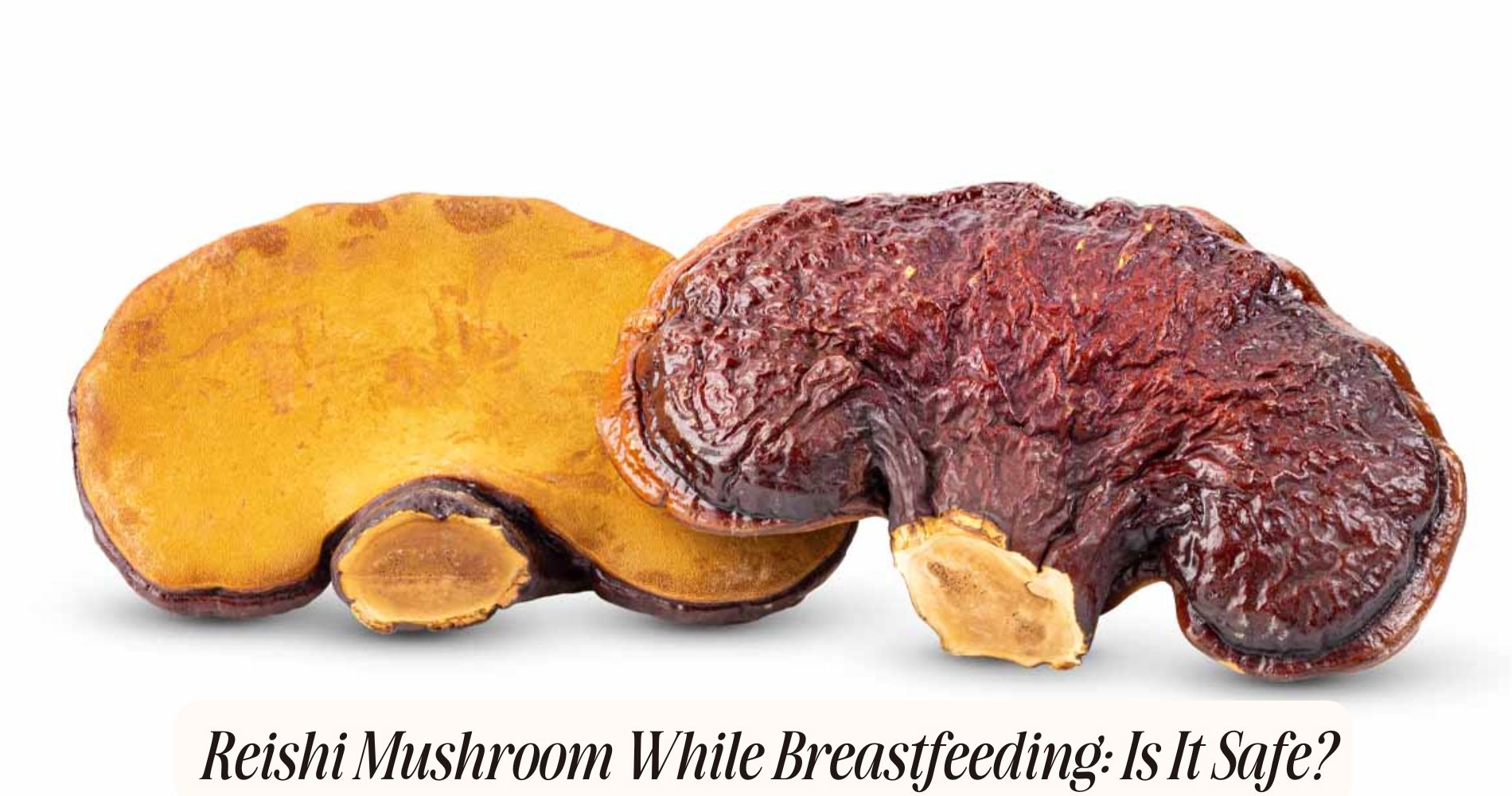
Carbs in Shiitake Mushrooms: Low or High?
Nutritional Profile of Shiitake Mushrooms
When you explore the nutritional profile of shiitake mushrooms, you'll find they're not just flavorful but also packed with beneficial compounds. Shiitake varieties, such as the black and golden types, offer distinct tastes and textures that enhance various dishes. They're low in calories yet rich in nutrients, making them a popular choice for health-conscious individuals.
These mushrooms contain essential vitamins, including B vitamins like riboflavin and niacin, which play crucial roles in energy metabolism. Furthermore, shiitakes are a good source of minerals like copper and selenium, both known for their antioxidant properties. The presence of polysaccharides, particularly lentinans, contributes to their immune-boosting effects.

In culinary uses, shiitake mushrooms can be sautéed, grilled, or added to soups, providing depth and umami flavor to meals. Their versatility allows you to incorporate them into a variety of cuisines, from stir-fries to Italian risottos.
Carbohydrate Content Overview
In examining the carbohydrate content of shiitake mushrooms, you'll find that they're relatively low in carbs, making them a suitable option for various dietary plans. Specifically, a 100-gram serving of shiitake mushrooms contains approximately 7 grams of carbohydrates. This low carb count is particularly beneficial for those following ketogenic or low-carb diets.
When considering carb types, most of the carbohydrates in shiitake mushrooms are complex polysaccharides. These complex carbs digest more slowly than simple sugars, providing sustained energy without causing rapid spikes in blood sugar levels.
Additionally, shiitake mushrooms boast a notable fiber content, with around 2 grams of dietary fiber per 100 grams. This fiber not only aids in digestion but also contributes to satiety, helping you feel full longer.
Comparisons With Other Mushrooms
When comparing shiitake mushrooms with other varieties, you'll notice differences in their nutritional profiles, particularly in carbohydrate content.
Analyzing these variations can help you understand how each type contributes to your diet and overall health.
Additionally, exploring the health benefits of different mushrooms may guide you in making informed dietary choices.
Nutritional Profile Comparison
Shiitake mushrooms stand out not only for their rich umami flavor but also for their unique nutritional profile compared to other popular mushrooms. When you compare shiitake varieties, like the dried and fresh options, you'll notice differences in their nutrient content.
Fresh shiitake mushrooms are lower in calories and carbohydrates than some other varieties, such as portobello or white button mushrooms, which can be denser in both aspects.
Moreover, shiitakes are particularly high in essential vitamins, including B vitamins, which are vital for energy metabolism. Cooking techniques can also influence their nutritional profile. For instance, sautéing shiitake mushrooms can enhance their flavor while preserving their nutrients, whereas boiling may lead to nutrient loss.
In contrast, button mushrooms are often lower in certain vitamins but higher in potassium.
While all mushrooms provide health benefits, shiitake mushrooms offer a unique combination of flavor and nutrients that can complement various dishes, making them a versatile choice.
Carbohydrate Content Analysis
Analyzing the carbohydrate content of shiitake mushrooms reveals some interesting comparisons with other mushroom varieties. Shiitake mushrooms contain approximately 7 grams of carbohydrates per 100 grams, a figure that places them on the lower end of the scale compared to varieties like portobello and white button mushrooms, which have around 9 and 4 grams, respectively.

What sets shiitake apart is their notable fiber source. They provide about 2 grams of dietary fiber per serving, contributing to digestive health and satiety. In contrast, other mushrooms, such as button mushrooms, offer slightly less fiber, which can affect overall nutrient intake.
When examining the glycemic index, shiitake mushrooms rank low, making them a suitable choice for those monitoring blood sugar levels. This characteristic is shared with many other mushroom types, but shiitake's unique flavor and texture can make them a preferred option for those looking to enhance their meals without greatly impacting carbohydrate intake.
Health Benefits Overview
Exploring the health benefits of shiitake mushrooms reveals several advantages compared to other varieties. Shiitake mushrooms are packed with essential nutrients, including B vitamins, copper, and selenium, which play vital roles in metabolism and immune function.
When you compare shiitake varieties to common options like button or portobello mushrooms, shiitake stands out for its higher concentration of lentinans—compounds linked to immune support and potential anti-cancer properties.
Additionally, shiitake mushrooms contain ergothioneine, an antioxidant that helps combat oxidative stress, which is less prevalent in many other mushrooms. Their unique culinary uses, from stir-fries to soups, allow you to easily incorporate these health benefits into your diet.
While button mushrooms are often praised for their versatility, they lack the robust flavor and health-boosting properties of shiitake. Portobello mushrooms, though meaty and filling, don't offer the same range of nutrients.
Health Benefits of Shiitake Mushrooms
Shiitake mushrooms boast a rich nutritional profile that can greatly enhance your diet.
They're not just flavorful; they also provide essential nutrients that support your immune system.
Nutritional Profile Overview
While you might think of mushrooms as mere culinary ingredients, shiitake mushrooms offer a remarkable nutritional profile that can enhance your health. These fungi are low in calories but packed with essential nutrients. A typical serving provides a good source of B vitamins, such as niacin and riboflavin, which support energy metabolism.
Additionally, shiitake varieties contain minerals like copper and selenium, important for immune function and antioxidant protection. When it comes to dietary fiber, shiitake mushrooms contribute to digestive health, helping you feel fuller longer.
Their unique flavor and texture make them versatile in various cooking techniques, whether sautéing, grilling, or adding to soups. Shiitake mushrooms can easily elevate the nutritional value of your meals, providing depth and richness without excessive calories.
Moreover, their low carbohydrate content makes them suitable for various dietary preferences, including low-carb and ketogenic diets. By incorporating shiitake mushrooms into your meals, you're not just enhancing flavor but also boosting overall nutrient intake.
This makes them a smart addition to your diet, combining health benefits with culinary creativity.
Immune System Support
Boosting your immune system can be as simple as incorporating shiitake mushrooms into your diet. These mushrooms are known for their immune-boosting properties, primarily due to their rich content of beta-glucans. Research shows that beta-glucans can enhance the activity of immune cells, promoting a more robust defense against pathogens.
One of the key benefits of shiitake mushrooms lies in their ability to regulate cytokines, which are essential for cell signaling in immune responses. By modulating cytokine production, shiitake mushrooms help maintain a balanced immune response, preventing excessive inflammation that can occur during infections.

This cytokine regulation is important for long-term health, as it allows your body to respond effectively to threats while minimizing potential damage from overactive immune reactions.
Additionally, shiitake mushrooms contain several antioxidants that combat oxidative stress, further supporting your immune system. Including these fungi in soups, stir-fries, or as a meat substitute not only enhances flavor but also fortifies your body's defenses.
Shiitake Mushrooms in Diets
Incorporating shiitake mushrooms into your diet can enhance both flavor and nutrition. These mushrooms are rich in essential nutrients, including vitamins B and D, which play significant roles in energy metabolism and immune function. The shiitake mushroom benefits extend to their potential anti-inflammatory and antioxidant properties, making them a valuable addition to any meal.
When it comes to shiitake culinary uses, these mushrooms are incredibly versatile. You can sauté them in stir-fries, add them to soups, or roast them to bring out their rich umami flavor. They not only elevate the taste of dishes but also contribute to a well-rounded diet.
Their low-calorie content and high fiber make them an excellent choice for those looking to manage their weight while still enjoying satisfying meals.
Moreover, shiitake mushrooms contain polysaccharides, which may support heart health and improve cholesterol levels. By incorporating shiitake mushrooms into your diet, you can enjoy their unique taste while reaping the numerous health benefits they offer.
Cooking Methods and Carbs
Understanding the nutritional profile of shiitake mushrooms includes examining their carbohydrate content, especially in relation to various cooking methods. Different cooking techniques can impact the overall carbohydrate levels and nutrient availability in these mushrooms.
For instance, sautéing shiitake mushrooms tends to preserve their nutrients while enhancing their umami flavor, making them a delicious addition to many dishes.
When you opt for grilling or roasting, you might notice a slight caramelization, which not only elevates the flavor but can also modify the carbohydrate profile. These methods can cause some moisture loss, concentrating the flavors and potentially affecting the carbohydrate density per serving.
Boiling, on the other hand, can lead to nutrient leaching, which may diminish their carbohydrate content and overall taste.
Steaming is another effective technique that retains nutrients while allowing you to enjoy the natural flavors of shiitake mushrooms.

Ultimately, the cooking method you choose plays a significant role in both the flavor enhancement of the mushrooms and their nutritional impact. By selecting the right technique, you can maximize the health benefits of shiitake mushrooms while savoring their rich, savory taste.
Portion Sizes and Carb Impact
Portion size greatly influences the carbohydrate impact of shiitake mushrooms in your diet. When you're mindful of portion control, you can effectively manage your overall carb intake. A standard serving size of shiitake mushrooms is typically around 1 cup cooked, which contains approximately 2 grams of carbohydrates. This amount is relatively low, making them an excellent choice for low-carb diets.
If you're looking to incorporate shiitakes into your meals, consider serving suggestions that allow you to enjoy their flavor while keeping carbohydrate content in check. For instance, adding a cup of sautéed shiitake mushrooms to stir-fries or salads can enhance the dish's nutritional value without greatly increasing carbs.
However, be cautious about larger portions, as they can quickly raise the carbohydrate count. If you consume 2 cups instead of 1, you double your carb intake from shiitakes, which could impact your dietary goals.
Tips for Including Shiitakes in Meals
When you want to jazz up your meals with shiitake mushrooms, there are plenty of creative ways to include them without overloading on carbs. These versatile fungi not only provide a rich, umami flavor but also a host of nutritional benefits.
Start by incorporating shiitakes into stir-fries, where they can absorb flavors from sauces and spices, enhancing your dish without adding significant carbs.
For quick shiitake recipes, consider adding them to soups or broths. Their depth of flavor can elevate even the simplest of recipes.
You can also grill or sauté shiitakes as a side dish, pairing them with proteins like chicken or tofu, which keeps your meal balanced and satisfying.
Flavor pairings are key. Shiitakes work well with garlic, ginger, and soy sauce, creating a robust taste profile.
Don't overlook their potential in salads—thinly sliced raw shiitakes can add a delightful crunch and earthy flavor.
Finally, experiment with shiitake-infused oils or sauces, which can enhance the taste of your favorite dishes while keeping carbs in check.
Elevate Your Health with Well Gummies' Ultimate Wellness Bundle
For those looking to harness the benefits of mushrooms in a convenient and delicious way, the Ultimate Wellness Bundle by Well Gummies is the ideal choice. This bundle features All-in-One Mushroom Gummies for daily support and Lion's Mane Focus and Energy Gummies to give you an extra boost when needed. Packed with 10 different types of mushrooms, these vegan gummies provide natural energy, sharper focus, and immune support, all while tasting like fresh wild berries. With no jitters or crashes, it's the perfect solution to keep you energized and balanced throughout the day!
Frequently Asked Questions
Are Shiitake Mushrooms Suitable for Low-Carb Diets?
If you're following a low-carb diet, shiitake mushrooms are a great option. Their low carb content, combined with nutritional benefits like vitamins and minerals, makes them a healthy addition to your meals without compromising your goals.
Can Shiitake Mushrooms Cause Allergic Reactions?
Yes, shiitake mushroom allergies can occur in some individuals. When you consume them, your immune response might trigger symptoms like itching or swelling. If you suspect an allergy, consult a healthcare professional for guidance.
How Should Shiitake Mushrooms Be Stored?
To store shiitake mushrooms, keep them in a paper bag in the refrigerator. This method offers ideal conditions, allowing them to breathe and stay fresh longer. Avoid plastic bags, as they trap moisture and promote spoilage.
Do Shiitake Mushrooms Provide Any Significant Protein?
Yes, shiitake mushrooms offer nutritional benefits, including a modest protein content. While they aren't a primary protein source, their unique amino acids can complement your diet, making them a valuable addition to meals for overall nutrition.
Are There Any Negative Side Effects of Eating Shiitake Mushrooms?
Eating shiitake mushrooms can cause digestive issues for some people, potentially affecting nutrient absorption. If you experience discomfort or allergic reactions, it's best to reduce intake or consult a healthcare professional for personalized advice.
Conclusion
Incorporating shiitake mushrooms into your diet can be a smart choice, especially if you're mindful of carbohydrate intake. With their low carb content compared to many other foods, they can be a flavorful addition to various meals. Plus, their health benefits, including immune support and potential cholesterol-lowering effects, make them even more appealing. By experimenting with different cooking methods and portion sizes, you can enjoy shiitake mushrooms while maintaining a balanced diet.




